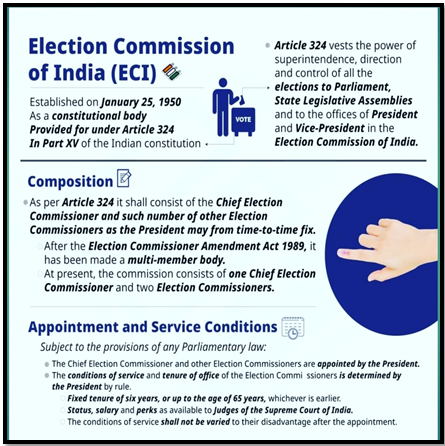CAN PARTIES BE DE-RECOGNISED OR DE-REGISTERED?
SYLLABUS:
- GS 2: Salient features of the Representation of People’s Act.
Focus:
- The Election Commission of India (ECI) in its report on enforcement of Model Code of Conduct (MCC) has stated that it expects star campaigners to lead by example and not vitiate the fabric of society. This has raised a debate about ECI powers to rein in MCC violations.
Powers of the Election Commission of India (ECI)
- Authority over MCC Violations: The ECI can bar leaders from campaigning for short periods for violating the Model Code of Conduct (MCC).
- Recommendations for Legal Amendments: In 2016, the ECI suggested amending the law to empower it to de-register parties.
- Law Commission’s Recommendations: The 255th report of the Law Commission (2015) recommended de-registering parties failing to contest elections for 10 consecutive years.
- Symbols Order Provision: Under Paragraph 16A of the Symbols Order, the ECI can suspend or withdraw recognition of parties for not observing the MCC.
- Past Instances: The ECI used its power under the Symbols Order once in 2015, suspending the National People’s Party for three weeks.
What are Registered Parties?
- Requirements under Section 29A of RP Act: A political party must submit its memorandum/constitution declaring allegiance to the Constitution and principles of socialism, secularism, democracy, and national unity.
- Legal Benefits for Registered Parties: These include tax exemptions on donations, a common symbol for elections, and twenty ‘star campaigners’ during election campaigns.
- Number of Registered Parties: As per the ECI, there are 2,790 active registered political parties in India.
- Purpose of Registration: Registration ensures parties adhere to democratic principles and uphold the sovereignty and integrity of the country.
- Consequences of Registration: It offers legal benefits and a framework to ensure parties operate within the bounds of the Constitution.
What are Recognised Parties?
- Definition and Criteria: Recognised parties are those which meet criteria under The Election Symbols (Reservation and Allotment) Order, 1968, by winning seats or obtaining a required vote percentage in elections.
- National and State Parties: Currently, there are six national parties and sixty-one state parties recognized by the ECI.
- Additional Concessions: Recognised parties enjoy reserved symbols during elections and have forty ‘star campaigners’.
- Importance of Recognition: Recognition gives parties a strategic advantage in elections, enhancing their visibility and credibility.
- Electoral Influence: Recognised parties often have greater influence in shaping electoral outcomes due to their established status.
Grounds for Derecognition of a Political Party as a National Party (As per ECI)
Electoral Performance Criteria:
- Fails to secure at least 6% of the total votes polled in the general election to the Lok Sabha (LS) or the legislative assembly of the state concerned.
- Fails to have at least 4 MPs elected in the last Lok Sabha polls.
- Does not win 1 seat in the Lok Sabha from the same state.
- Seat Criteria: Fails to win at least 2% of the total seats in the Lok Sabha from at least 3 states.
- State-Level Performance: Fails to secure 8% of the total valid votes polled in the state at a General Election to the Lok Sabha or to the State Legislative Assembly (LA).
Administrative Requirements:
- Fails to submit its audited accounts to the ECI on time.
- Fails to hold its organizational elections on time.
Derecognition vs. Deregistration
Derecognition:
- Refers to the loss of official status as a national or state party.
- The party can still contest elections but loses benefits such as a reserved electoral symbol.
Deregistration:
- Refers to the cancellation of the registration of a political party.
- The ECI is not currently empowered to deregister parties.
- Once deregistered, a party cannot contest elections.
Grounds for Deregistration of a Political Party
- Fraudulent Registration: The party’s registration was obtained by fraud.
- Illegal Declaration: The party is declared illegal by the Central Government.
- Constitutional Amendments: The party amends its internal Constitution and notifies the ECI that it can no longer abide by the Indian Constitution.
Issues with Registered Unrecognised Political Parties (RUPPs)
- Low Participation: Less than a third of RUPPs contest elections, raising concerns about their genuine political activity.
- Lack of ECI Powers: The RP Act does not grant explicit powers to the ECI to de-register parties for not contesting elections or failing to conduct inner-party elections.
- Supreme Court Ruling: The Supreme Court in 2002 ruled that the ECI cannot de-register parties under the RP Act except in cases of fraud or disloyalty to the Constitution.
- Misuse of Benefits: Non-participating RUPPs may misuse tax exemptions and donations for money laundering.
- MCC Violations: Recognised parties are frequently guilty of MCC violations, but ECI actions are limited to short-term campaign bans.
Recommended Actions
- Amendment to RP Act: Implementing the ECI’s 2016 suggestions to amend the law for de-registering parties is crucial.
- Law Commission’s Suggestions: The 255th report’s recommendation to de-register parties inactive for ten years should be enacted.
- Strict Enforcement of Symbols Order: The ECI should use its powers under Paragraph 16A more rigorously to ensure compliance with the MCC.
- Enhanced Penalties for Violations: Stricter penalties for MCC violations by recognised parties could deter misconduct.
- Regular Monitoring and Reporting: Continuous monitoring and transparent reporting of party activities can prevent misuse of registration benefits and ensure adherence to democratic principles.
| Representation of People Act 1951
About:
RPA and Political Parties:
|
Source:The Hindu
Mains Practice Question:
Discuss the powers and limitations of the Election Commission of India (ECI) regarding the de-recognition or de-registration of political parties. How can these powers be enhanced to ensure better enforcement of the Model Code of Conduct (MCC)?
Associated Articles:
https://universalinstitutions.com/category/daily-answer-writing-practice/gs-2/indian-polity-gs-2/




